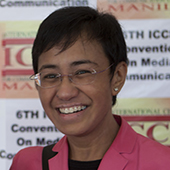SUMMARY
This is AI generated summarization, which may have errors. For context, always refer to the full article.

She doesn’t look her age as she walks onstage to speak to an international conference on press freedom in a country that’s just learning the ropes. If she had her way, Aung San Suu Kyi will be Myanmar’s next president in 2015, the year she turns 70 years old.
The symbol of democracy in her country, she faces a tough battle: she and her party must work to change the constitution which has a clause that seems tailor-made to keep her from running. It says very specifically that someone with a spouse or children of foreign nationality is barred from the top post in the land.
It may well be the last, and toughest, hurdle for a woman who fought a military junta frontally and spent 15 years in detention for it. She jokes that she and her party have gotten in a lot of trouble for telling the truth over the years.
Now she encourages journalists in her country to understand that freedom goes hand-in-hand with responsibility, and that the role of a free press is to speak truth to power.
“What we are trying to do is to make sure the culture of democracy takes root in our country,” says Suu Kyi. “If there is no free press to let the people and government know what is going on in our country, what needs to be changed and what needs to be improved and corrected, those in power will become complacent. As it is, I think they’re already too complacent for their own good!” she adds sparking laughter from the audience.
In by-elections in April, 2012, Suu Kyi’s party, the National League for Democracy (NLD), won 43 of the 44 seats where its candidates ran. It’s seen by many here as proof of her party’s popularity that could bring a landslide win in the general election of 2015.
Aware of these speculations, she outlines a larger vision: “These days people are over-concerned with the 2015 elections. We all have to remember that the 2015 election is just a stepping stone in the long journey that lies ahead for our country.”
Suu Kyi then talks about an interesting possibility: that a nation kept underdeveloped by its military rulers can now leapfrog development.
“I would like this country to be a beacon of hope for the international community, for the human race. We want to succeed in a way that other people have not been able to succeed before,” she said in precise, measured tones. “I say this not because I think the Burmese are better people but because we have been left far behind in the race towards development during the last four or five decades.”
It reminds me of the towns of Kwamki Lama and Timika in Papua (Irian Jaya) in Indonesia, where a 30-minute drive by car can move you in time from the stone age to the 21st century. You move quickly from semi-naked villagers, Asmat carvers, and 21st century hotels – all existing in the same space. That was leapfrogging development, driven largely by mining interests.
Co-existence
In a way, that’s what’s happening to Myanmar today, where a boom in development will allow the past and the future to co-exist in the same space. Like newspapers, mobile apps and Facebook.
The number of newspapers grew tremendously in the past few years, at the same time the Burmese flocked to Facebook.
In other countries, the Internet and social media helped democracies grow, with citizens going online to demand greater accountability from their governments. That’s something that may take longer in Myanmar, where Internet penetration rate is at a paltry 1%-3% and consumer prices for broadband access remain among the highest in the world.
Only about 600,000 to 800,000 of Myanmar’s estimated 55 million people are Internet users. IT experts say for most of them, Facebook is the Internet. Still, the entry of foreign players in the telecommunications industry in July 2013 will help: estimates say mobile access is expected to grow to as high as 80% by 2016. Which means the country will leapfrog computer access to the Internet and go directly to mobile access.
Still, the Internet and social media bring their own problems. Today, Myanmar is dealing with hate speech directed largely against its Muslim minority, much of it on the Internet.
Suu Kyi herself has had to deal with anonymous attacks online which observers say may be part of a concerted government effort against her.
“There’s not much we can do about it apart from fostering a sense of responsibility in individuals,” says Suu Kyi. “Because we don’t know who writes these things. And quite often the stories you come across are total fabrications. And we just have to adopt this policy that we can’t respond to each and every one of them because anybody can write anything they like. We don’t have time to refute every little bit of fiction that’s put online.”
These are only some of the challenges Myanmar faces as it opens its gates to the world. The excitement is apparent when you walk the streets of Yangon.
Myanmar’s youth want to hear stronger words from Suu Kyi, especially on issues of human rights and free speech. Many say her sometimes opaque language is disappointing, but she is a woman who now has to balance numerous interests to keep her political path on track.
In many ways, Suu Kyi represents how the past, present and future come together in one. – Rappler.com
Add a comment
How does this make you feel?
There are no comments yet. Add your comment to start the conversation.